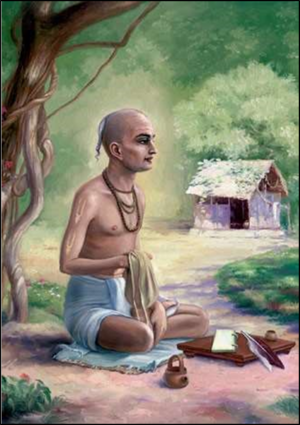Talk:Non-Disputation
By Vishal Agarwal
Bhaktas must not rely on logical arguments and disputations, because these can be multifaceted (unending) and inconclusive. Nārada Bhakti Sūtras 74-75
In the verse Gita 12.15, Krishna says that the devotee who is neither afflicted or troubled by the world, not by whom others are afflicted or troubled is extremely dear to him.
It is said that when Nimbārkāchārya wrote his commentary on the Brahmasūtras, he deliberately avoided criticizing earlier interpretations by Shankaracharya etc., with which he did not agree. Likewise, when his direct disciple Shrīnivāsa wrote an elaborate gloss on this commentary, his Guru Nimbārka directed him not to criticize other opinions. Both the commentary and the gloss thereon are available today and they are free of criticism of other views, focusing only on explaining the views of Nimbārka and Shrinivāsa.
Story: Shri Jīva Goswami learns the Virtue of Forbearance & Non-Disputation
Once, a scholarly Pandit who was a great debater arrived at Vrindavana. The locals told him about Sri Sanatana Goswami (1488 – 1558 CE), a great saint, and a great scholar of that holy town. The Pandit approached Sri Sanatana and challenged him to a debate, “Either you defeat me in a debate on the scriptures, or you should write a declaration that I am a greater scholar than you.” Sri Sanatana Goswami was always immersed in the devotion of Krishna. Although he could have defeated the Pandit easily, he did not want to puncture the Pandit’s enthusiasm and self-respect. And so, he wrote the declaration that the Pandit was a greater scholar, and handed the same to him.”
The Pandit was overjoyed. He went all over the town, accompanied by musicians who chanted the praises of his scholarship. Suddenly, Sri Jiva Goswami, the nephew of Sri Sanatana, and a saint and a scholar in his own right, heard about the Pandit having defeated his uncle. He approached the Pandit and challenged him to a debate. The Pandit lost. Still angry at him for having coerced his uncle to write the declaration, Jiva Goswami snatched all the declarations of victory that the Pandit used to carry with him, and forced him to write a new one saying he was inferior in his learning to Jiva Goswami.
When this news reached Sri Sanatana Goswami, he was very upset with his nephew and said, “Tell Jiva that I do not want to see his face again. He has destroyed the enthusiasm for learning, and the self-respect of a Pandit. I have no use of the pride of learning, but for some people, that is a good driving force to make them study and learn continuously. Therefore, what he did to that Pandit was not right.” Sri Jiva Goswami was very repentant at what he had done. And it was only after several penances and pleadings that Sri Sanatana eventually forgave his nephew and met him[1]. This beautiful story demonstrates that in this world, there are people at different levels of spiritual attainment. Some of those who are at lower levels, become proud and small accomplishments, just as little kids feel pride in being able to read their first sentences, or when they are praised by their teacher. But this does not mean that we should stoop to the level of these people and become like them. And even more important, we should not look down upon them or humiliate them, because at their stage of understanding, pride and rewards are indeed big motivators to keep them going on the path of spiritual enlightenment. They who are at higher levels should constantly encourage those who are below them, with love, compassion and understanding, rather than ‘show them their place.’ Only a heartless adult will humiliate little children who are still learning the alphabet by showing off his own learning in front of them.
References[edit]
- ↑ Swami Akhandananda Saraswati. Narada Bhakti Darshana. Satsahitya Prakashan, 1966, p. 362. Bombay.

